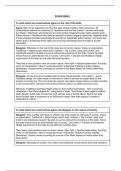Exam (elaborations)
Ideologies (socialism, liberalism, conservatism) essay plans
- Module
- Ideologies essay plans
- Institution
- PEARSON (PEARSON)
This is an in-depth document containing various essay plans on topics of liberalism, conservatism, and socialism. It is very helpful as it considers the points of both arguments to the question. It links thinkers and contains quotes.
[Show more]




